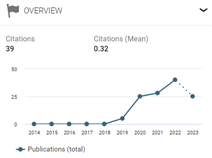Implementasi Health Belief Model terhadap pelaksanaan vaksinasi untuk penanggulangan pandemi Corona Virus Diseases-19 (Covid-19) pada tenaga kesehatan Kabupaten Nagan Raya
DOI: 10.30867/gikes.v3i1.767Abstract
Background: World Health Organization (WHO) has declared Coronavirus Disease 2019 (COVID-19) as a pandemic. Interventions are needed not only in terms of implementing health protocols but also other effective interventions to decrease the transmission of disease through vaccination efforts which are aimed at reducing transmission/transmission of COVID-19, reducing morbidity and mortality due to COVID-19, and achieving group immunity in the community society (herd immunity).
Objective: The purpose of this study was to identify the implementation of a health belief model for the implementation of vaccination in the context of overcoming the COVID-19 pandemic in health workers within the Nagan Raya District Health Office.
Method: The type of research used a descriptive-analytic approach with a cross-sectional study design with a total sampling method of sampling. The sample in this study was 76 health workers from a population of 76 health workers at the Nagan Raya District Health Office. This study was conducted from March to September 2021. Data analysis used Chi-Square statistical test and Binary Logistic Regression with a significance level of 95%.
Results: The results of this study indicate that there is a significant relationship between perceived susceptibility (p = 0.041), perceived benefits (p = 0.047), and cues to action (p = 0.037) with the implementation of vaccination in the context of dealing with the COVID-19 pandemic for health workers. There is no relationship between perceived severity (p = 1,000) and perceived barriers (p = 0,280) with the implementation of vaccination in the context of dealing with the COVID-19 pandemic in health workers.
Conclusion: The dimension of the health belief model that is highly dominant related to the implementation of vaccination in the context of dealing with the COVID-19 pandemic in health workers is the perceived susceptibility variable with a value of p= 0.041 and Exp (B) = 5.376.
Keywords
Full Text:
PDFReferences
Abdelhafiz, A. S., Mohammed, Z., Ibrahim, M. E., Ziady, H. H., Alorabi, M., Ayyad, M., & Sultan, E. A. (2020). Knowledge, Perceptions, and Attitude of Egyptians Towards the Novel Coronavirus Disease (COVID-19). Journal of Community Health. https://doi.org/10.1007/s10900-020-00827-7
Akseer, N., Kandru, G., Keats, E. C., & Bhutta, Z. A. (2020). COVID-19 pandemic and mitigation strategies: implications for maternal and child health and nutrition. The American Journal of Clinical Nutrition, 112(2), 251–256. https://doi.org/10.1093/ajcn/nqaa171
Al Rahmad, A. H. (2021). Several Risk Factors of Obesity Among Female School Teachers and Relevance to Non-Communicable Diseases During the Covid-19 Pandemic. Amerta Nutrition, 5(1), 31–40. https://doi.org/http://dx.doi.org/10.20473/amnt.v5i1.2021.31-40
Aradista, A. M. (2020). Hubungan Antara Health Belief Model dengan Perilaku Kepatuhan Kebijakan Pembatasan Sosial Berskala Besar (PSBB) Selama Pandemi COVID-19 pada Emerging Adult. SUKMA: Jurnal Penelitian Psikologi, 1(2), 117–130.
DeRoo, S. S., Pudalov, N. J., & Fu, L. Y. (2020). Planning for a COVID-19 vaccination program. Jama, 323(24), 2458–2459.
Dinkes Nagan Raya. (2021). Laporan Pelaksanaan Vaksinasi COVID-19 Tahap 1; Sasaran Tenaga Kesehatan Tahun 2021. Suka Makmue.
Dodd, R. H., Pickles, K., Nickel, B., Cvejic, E., Ayre, J., Batcup, C., Bonner, C., Copp, T., Cornell, S., & Dakin, T. (2021). Concerns and motivations about COVID-19 vaccination. The Lancet. Infectious Diseases, 21(2), 161.
Fakhrina, D. (2021). Hubungan Tingkat Pengetahuan Covid-19 Terhadap Persepsi Masyarakat Tentang Vaksinasi Anak Di Wilayah Kerja Puskesmas Lampulo. ETD Unsyiah.
Hupunau, R. E. R. I. (2019). Analisis Faktor Yang Berhubungan Dengan Perilaku Ibu Dalam Pemenuhan Kebutuhan Nutrisi Pada Anak Usia Toddler Berdasarkan Teori Health Belief Model. Universitas Airlangga.
Indriyanti, D. (2021). Persepsi Petugas Puskesmas terhadap Pelaksanaan Vaksinasi Covid-19 pada Era New Normal.
Iskandar, I., Hadi, A., & Alfridsyah, A. (2017). Faktor risiko terjadinya penyakit jantung koroner pada pasien Rumah Sakit Umum Meuraxa Banda Aceh. AcTion: Aceh Nutrition Journal, 2(1), 32–42. https://doi.org/http://dx.doi.org/10.30867/action.v2i1.34
Kemenkes RI. (2020). Pedoman Pencegahan Dan Pengendalian Coronavirus Disease 2019 (COVID-19). Revisi 5. Jakarta. Direktorat Jenderal PP dan PL Kemenkes RI.
Kemenkes RI. (2021). Petunjuk Teknis Pelaksanaan Vaksinasi Dalam Rangka Penanggulangan Pandemi Corona Virus Disease 2019 (COVID-19). Jakarta. Kemenkes RI.
Lidiana, E. H., Mustikasari, H., Pradana, K. A., & Permatasari, A. (2021). Gambaran karakteristik kejadian ikutan pasca vaksinasi covid-19 pada tenaga kesehatan alumni Universitas ‘Aisyiyah Surakarta. Jurnal Ilmiah Kesehatan, 11(1), 11–17.
Rizqi, A. (2018). Health belief model pada penderita diabetes melitus. UIN Sunan Ampel Surabaya.
Schoch-Spana, M., Brunson, E. K., Long, R., Ruth, A., Ravi, S. J., Trotochaud, M., Borio, L., Brewer, J., Buccina, J., & Connell, N. (2021). The public’s role in COVID-19 vaccination: Human-centered recommendations to enhance pandemic vaccine awareness, access, and acceptance in the United States. Vaccine, 39(40), 6004–6012.
Shmueli, L. (2021). Predicting intention to receive COVID-19 vaccine among the general population using the health belief model and the theory of planned behavior model. BMC Public Health, 21(1), 1–13.
Sila, A. (2018). Faktor-Faktor Yang Berhubungan Dengan Perilaku Seks Bebas Remaja Di Tinjau Dari Health Belief Model Di SMAN 1 Pasir Putih Kabupaten Muna. STIKES Mandala Waluya.
Swarjana, I. K. (2016). Metodologi Penelitian Kesehatan [Edisi Revisi](M. Bendatu. Andi.
Tay, M. Z., Poh, C. M., Rénia, L., MacAry, P. A., & Ng, L. F. P. (2020). The trinity of COVID-19: immunity, inflammation and intervention. Nature Reviews Immunology, 20(6), 363–374. https://doi.org/10.1038/s41577-020-0311-8
World Health Organization. (2020). Coronavirus (COVID-19). World Health Organization.
Refbacks
- There are currently no refbacks.













